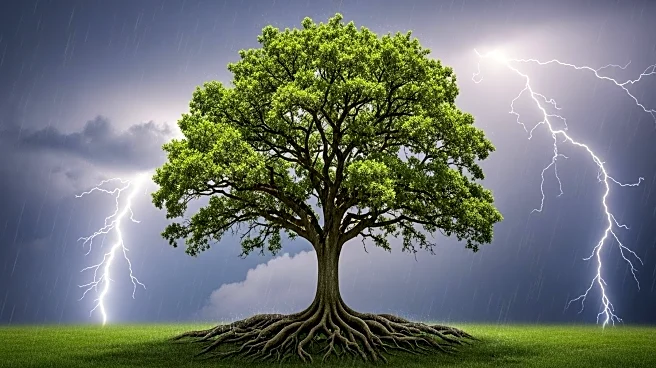What's Happening?
The United States has played a crucial role in supporting Ukraine's energy resilience during the ongoing conflict with Russia. This effort involved disconnecting Ukraine from the Russian energy grid and connecting it to Europe's grid, ensuring a steady flow of energy resources. The initiative was led by President Biden's energy envoy, Amos Hochstein, and involved coordination with European allies. As winter approaches, concerns arise due to Russia's increased drone and missile attacks on Ukraine's civilian infrastructure, particularly targeting energy facilities. The European Union has allocated $500 million to support Ukraine's energy needs, but questions remain about the U.S.'s continued involvement, especially after the Trump administration reportedly canceled a key energy security project.
Why It's Important?
The energy resilience of Ukraine is critical as it faces potential energy shortages during the harsh winter months, exacerbated by Russian attacks. The U.S.'s previous efforts have helped Ukraine withstand past winters, but the current geopolitical climate raises concerns about future support. The European Union's financial commitment highlights the importance of international cooperation in sustaining Ukraine's energy infrastructure. The situation underscores the broader implications of energy security in geopolitical conflicts, affecting not only Ukraine but also European energy stability and diplomatic relations.
What's Next?
As winter approaches, the focus will be on whether the U.S. will renew its efforts to support Ukraine's energy infrastructure. The European Union's initiatives may need to be complemented by U.S. support to ensure Ukraine's energy resilience. Diplomatic efforts may continue to seek a resolution to the conflict, but Russia's strategy to leverage winter conditions poses a significant challenge. The potential for increased sanctions against Russia and further military support for Ukraine could shape the geopolitical landscape in the coming months.
Beyond the Headlines
The ongoing conflict and energy challenges in Ukraine highlight the ethical and humanitarian dimensions of warfare, where civilian infrastructure becomes a target. The situation also raises questions about the long-term sustainability of energy systems in conflict zones and the role of international diplomacy in addressing such crises. The geopolitical dynamics could lead to shifts in energy policies and alliances, influencing global energy markets and security strategies.









